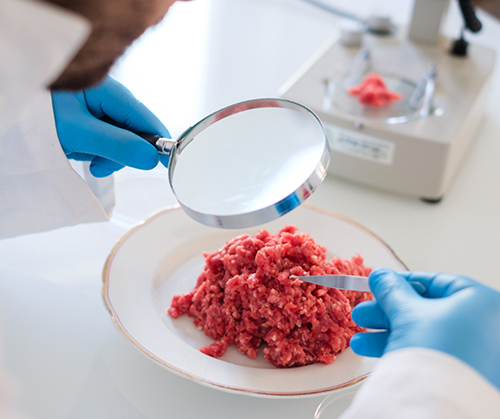
Satisfaction with plant-based meat substitutes
increases among Belgians
Thursday August 27, 2020 - Brussels, August 28, 2020 -
A survey by the Ipsos design office, commissioned by GAIA, shows that more than half of Belgians are satisfied with plant-based meat substitutes.
This is a significant increase from 2019 (44%).
“People are increasingly acting consciously with food,” says GAIA President Michel Vandenbosch.
Plus, plant-based meat substitutes are more appealing than ever.
“This combination of awareness and technology helps advance animal welfare. ".
The survey figures for cultured meat are also encouraging: 44% of Belgians have a positive opinion of cultured meat.
51% find that the current supply of meat alternatives meets their needs.
This emerges from a survey carried out by Ipsos between 10 and 16 June with a representative sample of the Belgian population.
In the previous survey, released in January 2019, which contained exactly the same questions, the figure was 44%.
In a year and a half, the craze for meat substitutes has therefore increased considerably.
It is especially young people in their twenties and early thirties who react positively to the offer, 65% say they are satisfied.
The three main motivations are the variety of offer, animal welfare and environmental awareness.
The main barrier remains taste and texture.
Based on the answers, meat substitutes don't taste the same as meat.
Price also seems to play a role.
Michel Vandenbosch: "Meat substitutes get a good rating, but there is clearly a potential to improve taste and texture."
Cultured meat
The survey also took a closer look at the idea that the Belgian population has of cultivated meat.
This is obtained from animal cells instead of slaughtered animals.
44% of Belgians have a positive first impression of cultured meat, which is comparable to 42% in January 2019.
The main reasons are the absence of animal suffering and the positive impact on the environment.
The biggest barrier is the impression that the price is higher.
The tradition of slaughtering animals to produce meat is irrelevant to respondents, this argument gets even the lowest score.
It should also be noted that the number of people without an opinion remains high: in 2020 it was 39%, against 43% in 2019.
“As long as cultured meat is off the shelves of stores, the number of undecided will remain high.
The fact that those who are openly opposed to cultured meat are a minority (17%) is already encouraging.
And killing animals for their meat is not seen as a necessity by the respondents, ”emphasizes Michel Vandenbosch.
Men, young people (18-34 years) and Belgians from a higher social class have a better first impression of the cultivated meat.
Flemish people (51%) are more likely than Walloons (33%) to have a good first impression.
More than half of Belgians are ready to taste it. “Our country therefore seems very curious about cultivated meat and also expresses a willingness to try and taste it. "
|
